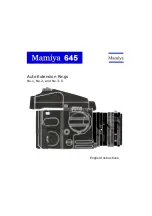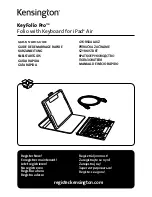
11
Regularly check the correct stretching of the inner visor to prevent the same from moving and scratching
both surfaces.
If the helmet visor fogs up and/or condensation forms between the visors, check both for system correct
assembly and stretching.
An excessive and early stretch of the inner visor may result in excessive adherence against visor surface
and/or permanent deformations with subsequent inability to perform following adjustments correctly.
The extended use under special weather conditions may reduce system performance and result in par-
tial fogging and problems of condensation on the inner visor. In this case, remove the inner visor from the
helmet visor and dry it with dry and lukewarm air to restore system efficiency.
Intense sweating /breathing, the use under particular weather conditions (low temperatures, and/or high
humidity and/or sudden changes in temperature or heavy rain) and intense and prolonged use may affect
the performance of the system and cause the fogging or formation of condensation on the inner visor.
In such cases, after using the helmet and to restore the system efficiency, remove the inner visor from the
helmet visor and let it dry with dry and lukewarm air. The same procedure must be applied to the helmet,
in order to dry out humidity in case it has formed up as a consequence of the conditions described above.
2
PINLOCK
®
INNER VISOR DISASSEMBLY
2.1 Remove the visor equipped with Pinlock
®
inner visor.
2.2 Widen the visor and release the Pinlock
®
inner visor from the pins (Fig. 9).
2.3 Release the visor.
MAINTENANCE AND CLEANING
Remove the Pinlock
®
inner visor from the visor. Using a damp and soft cloth, gently clean it with neutral
liquid soap. Remove the soap under running water.
Dry the inner visor with dry and lukewarm air without wiping it.
To keep the features of the inner visor in good conditions over time, let the helmet dry in a ventilated and
dry place with the visor open after use.
Keep it away from heat sources and store it in a place away from direct light.
TOP VENTILATION SYSTEM (Fig. 11)
The innovative top ventilation system allows conveying air into the shell:
- A position (button on the front) ventilation system closed
- B position (button on the back) conveys air into the shell
LOWER VENTILATION SYSTEM (Fig. 12)
The innovative lower ventilation system is controlled by a practical, easy to handle device that, located on
the bottom of the chin guard, allows conveying air directly to the visor to limit fogging and formation of
condensation:
A) close
B) open
REAR EXTRACTOR (Fig. 13)
The rear extractor, located under the spoiler, ensures optimal heat dissipation.
•
WIND PROTECTOR
This accessory allows improved helmet performance under certain conditions of use.
The Wind Protector prevents unpleasant infiltrations of air under the chin. See Fig. 14 for the assembly
and disassembly.
Summary of Contents for N64
Page 44: ...44...
Page 45: ...A 45 E v...
Page 46: ...46 1 1 1 1 2 3 1 3 4 1 4 2 2 1 5 2 2 6 2 3 3 3 1 3 2 6 3 3 5 4 MA 4 1 3 4 4 2 EPS 7 4 2...
Page 49: ...Fig 1 Fig 3 Fig 4 Fig 5 Fig 2 Fig 6 B1 A B2 B2 B1...
Page 50: ...Fig 9 Fig 8 Fig 7 Fig 10 MIN MAX Fig 11 A Fig 11 B...












































